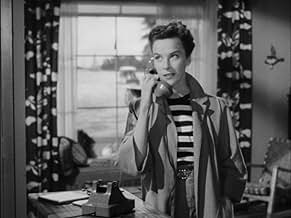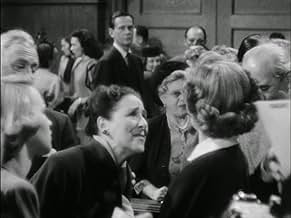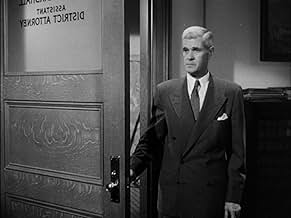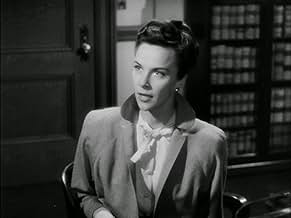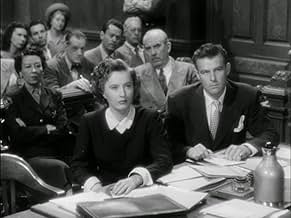IMDb RATING
6.9/10
3.5K
YOUR RATING
Assistant district attorney Cleve Marshall falls for the mysterious Thelma Jordon when she seeks help solving robberies of her aunt's estate.Assistant district attorney Cleve Marshall falls for the mysterious Thelma Jordon when she seeks help solving robberies of her aunt's estate.Assistant district attorney Cleve Marshall falls for the mysterious Thelma Jordon when she seeks help solving robberies of her aunt's estate.
Kasey Rogers
- Dolly
- (as Laura Elliot)
Gertrude Hoffman
- Aunt Vera Edwards
- (as Gertrude W. Hoffman)
Kate Drain Lawson
- Clara
- (as Kate Lawson)
- Director
- Writers
- All cast & crew
- Production, box office & more at IMDbPro
6.93.4K
1
2
3
4
5
6
7
8
9
10
Featured reviews
great tale that keeps twisting nicely
Perfectly decent noirish outing with excellent performance from Barbara Stanwyck, even if she has done much the same before. Small argument in my house where both my son and wife reckoned that the only problem was that they couldn't see the attraction of the femme fatale herself! I certainly beg to differ and feel most drawn to the feline duplicity of her sinister assuredness, but there we go. Even so a great tale that keeps twisting nicely so that even though you know she must be a baddie, the ever turning tale, especially when we get to court keeps you guessing. Wendell Corey is impressive as the assistant DA if not as a lover, but that's just me.
Another classic film from the film noir era
So much has already been said about this film, so I don't have to elaborate. All I can say about this movie is "oh my!". The reason being is that during the late 40's and early 50's a film about infidelity, even though popular at the time (Nora Prentiss, The Postman Always Rings Twice) was viewed by many as taboo, but that didn't stop them from flocking to the local theater to see it!
What puzzles me is that this film has been ignored. It is a well crafted movie with all the elements of a good film noir. It has crime, it has sex, it has deception and it has corruption throughout and it has great cinematography; what a perfect noir! If you have a chance to see this film on TCM, do yourself a favor and make a copy. You will not be disappointed.
What puzzles me is that this film has been ignored. It is a well crafted movie with all the elements of a good film noir. It has crime, it has sex, it has deception and it has corruption throughout and it has great cinematography; what a perfect noir! If you have a chance to see this film on TCM, do yourself a favor and make a copy. You will not be disappointed.
I'm no good for any man for any longer than a kiss!
The File on Thelma Jordon is directed by Robert Siodmak and written by Ketti Frings and Marty Holland. It stars Barbara Stanwyck, Wendell Corey, Paul Kelly, Joan Tetzel, Stanley Ridges and Richard Rober. Music is by Victor Young and cinematography by George Barnes.
Assistant district attorney Cleve Marshall (Corey) falls for Thelma Jordon (Stanwyck) after she seeks help solving a problem with prowlers and burglars. But is there more to Thelma than meets the eye?
Probably due to availability issues in home viewing formats, this appears to be one of film noir legends Siodmak and Stanwyck's under seen pictures. Which is a shame, for although it is often tagged as something of a lesser value Double Indemnity, it's a noir that noir lovers can get great rewards from.
As we are in noirville the plot isn't at all surprising. Stanwyck fronts up for what we expect is femme fatale duty, Corey looks to be on course for being a hapless loser dude, Kelly is up for some tough copper portrayal, while Rober stalks the edges of the frame as bad news bloke. A despicable crime is at the core of the story, and characterisations are straight out of the dark alleyway (Thelma has murky secrets and ideals, Wendell is unhappily married with a drink problem). Running at 100 minutes in length, the pic does feel a touch too long, especially given that the first thirty minutes is focused on building the principal players, where they are at in their life and the build up of their relationship. This asks for faith in staying with the piece, in hope it rewards for the following hour plus. Thankfully it does.
As the crime arrives, we are treated to noir nirvana as per style of film making. It's the middle of the night in a house menaced by shadows as the wind bashes an open window shutter. For a good twenty minutes, prior to - during - and post the crime, the house is a scary monstrous place, perfect for a dark deed to be enacted. The great Siodmak (The Killers, The Spiral Staircase, Criss Cross) is in his element on this, where aided by the superb photographic skills of Barnes (Rebecca, Force of Evil), the staging of scenes and the visuals enhance the moody machinations of the plot. As does Young's dramatic musical score. So with acting performances comfortably on par for the good, the tech credits are high.
Irks come with that drawn out first third of film, and the ending poses some question marks as well. Personally I would have liked it to have finished five minutes earlier, but as it stands there's a sort of double whammy with the finale. Some will find it contrived, others will applaud the ultimate outcome since it doesn't cop out. Either way, this is a noir film worthy of seeking out for the like minded purveyors of such things. 7/10
Assistant district attorney Cleve Marshall (Corey) falls for Thelma Jordon (Stanwyck) after she seeks help solving a problem with prowlers and burglars. But is there more to Thelma than meets the eye?
Probably due to availability issues in home viewing formats, this appears to be one of film noir legends Siodmak and Stanwyck's under seen pictures. Which is a shame, for although it is often tagged as something of a lesser value Double Indemnity, it's a noir that noir lovers can get great rewards from.
As we are in noirville the plot isn't at all surprising. Stanwyck fronts up for what we expect is femme fatale duty, Corey looks to be on course for being a hapless loser dude, Kelly is up for some tough copper portrayal, while Rober stalks the edges of the frame as bad news bloke. A despicable crime is at the core of the story, and characterisations are straight out of the dark alleyway (Thelma has murky secrets and ideals, Wendell is unhappily married with a drink problem). Running at 100 minutes in length, the pic does feel a touch too long, especially given that the first thirty minutes is focused on building the principal players, where they are at in their life and the build up of their relationship. This asks for faith in staying with the piece, in hope it rewards for the following hour plus. Thankfully it does.
As the crime arrives, we are treated to noir nirvana as per style of film making. It's the middle of the night in a house menaced by shadows as the wind bashes an open window shutter. For a good twenty minutes, prior to - during - and post the crime, the house is a scary monstrous place, perfect for a dark deed to be enacted. The great Siodmak (The Killers, The Spiral Staircase, Criss Cross) is in his element on this, where aided by the superb photographic skills of Barnes (Rebecca, Force of Evil), the staging of scenes and the visuals enhance the moody machinations of the plot. As does Young's dramatic musical score. So with acting performances comfortably on par for the good, the tech credits are high.
Irks come with that drawn out first third of film, and the ending poses some question marks as well. Personally I would have liked it to have finished five minutes earlier, but as it stands there's a sort of double whammy with the finale. Some will find it contrived, others will applaud the ultimate outcome since it doesn't cop out. Either way, this is a noir film worthy of seeking out for the like minded purveyors of such things. 7/10
The Past of Thelma Jordon
The Assistant District Attorney Cleve Marshall (Wendell Corey) has an unhappy marriage with his wife Pamela Blackwell Marshall (Joan Tetzel) due to the interference of her father, Judge Calvin H. Blackwell (Minor Watson). He decides to drink in his office after hours instead of going to the birthday party of Pamela. Out of the blue, a woman named Thelma Jordon (Barbara Stanwyck) arrives at the office looking for Cleve's boss to report an attempt of robbery of her wealthy Aunt Vera Edwards (Gertrude W. Hoffman) and she ends the night drinking and dancing with Cleve in a restaurant. Soon they have a love affair and Cleve falls in love with Thelma. But he does not know anything about the past of the mysterious Thelma. When Aunt Vera is murdered at home, Thelma calls Cleve to help her since she would be the prime suspect of shooting her aunt. He covers up the evidences that might link Thelma to the death becoming her accomplice and is assigned to be the prosecutor of her judgment. What will happen to Thelma and Cleve?
"The File on Thelma Jordon" is a fine film-noir directed by the master Robert Siodmak. Barbara Stanwyck performs the typical femme fatale, seducing the assistant DA Cleve Marshall and destroying his life. The moralist conclusion could have been better but the film is worthwhile watching. My vote is eight.
Title (Brazil): "A Confissão de Thelma" ("The Confession of Thelma Jordon")
"The File on Thelma Jordon" is a fine film-noir directed by the master Robert Siodmak. Barbara Stanwyck performs the typical femme fatale, seducing the assistant DA Cleve Marshall and destroying his life. The moralist conclusion could have been better but the film is worthwhile watching. My vote is eight.
Title (Brazil): "A Confissão de Thelma" ("The Confession of Thelma Jordon")
Turns out she was a Dame with a conscience
From her first entrance, Stanwyck kept me captivated by her performance in this film. There is something about her that draws you in and holds you. You know there is more to her than meets the eye - but you're not sure what exactly.
I have always admired Stanwyck. She was born Ruby Stevens, a Brooklyn girl that worked for a phone company and then became a chorus girl, before finally going to Hollywood to chase her dreams. She was nominated 4 times for an Oscar for Best Actress ("Stella Davis", "Ball of Fire", "Double Indemnity", "Sorry ,Wrong Number") but never won - except for an Honorary Oscar near the end of her life. She was considered a gem to work with for her serious but easy going attitude on the set (unlike many of her contemporary peers). This makes me like her even more!
I thought the cinematography in this film was outstanding. I loved the elaborate sets and and set decorating.
The plot kept me intrigued as well. Corey plays the perfect fall guy for Stanwyck. His average looks and dull exterior tend to make you feel sympathetic for this guy. Some have commented that they didn't have much chemistry together. I agree that they are an unlikely couple, but it helps you see how he could get so caught up in her and be willing to sacrifice so much. She was obviously outside his league.
There are some nice twists and turns in the plot that will keep you interested - especially at the end. It's worth a watch.
I have always admired Stanwyck. She was born Ruby Stevens, a Brooklyn girl that worked for a phone company and then became a chorus girl, before finally going to Hollywood to chase her dreams. She was nominated 4 times for an Oscar for Best Actress ("Stella Davis", "Ball of Fire", "Double Indemnity", "Sorry ,Wrong Number") but never won - except for an Honorary Oscar near the end of her life. She was considered a gem to work with for her serious but easy going attitude on the set (unlike many of her contemporary peers). This makes me like her even more!
I thought the cinematography in this film was outstanding. I loved the elaborate sets and and set decorating.
The plot kept me intrigued as well. Corey plays the perfect fall guy for Stanwyck. His average looks and dull exterior tend to make you feel sympathetic for this guy. Some have commented that they didn't have much chemistry together. I agree that they are an unlikely couple, but it helps you see how he could get so caught up in her and be willing to sacrifice so much. She was obviously outside his league.
There are some nice twists and turns in the plot that will keep you interested - especially at the end. It's worth a watch.
Did you know
- TriviaThe actors portraying Wendell Corey's character's children are Corey's real life children, Jonathan Corey and Robin Corey.
- GoofsCleve Marshall sits down at the desk opposite Miles Scott and says, "Can't talk till I have another drink." Scott picks up the whiskey bottle and pulls out the cork before handing it to Marshall. Marshall picks up the bottle and again pulls out the cork.
- Quotes
Thelma Jordon: I'm no good for any man for any longer than a kiss!
- Alternate versionsThis film was published in Italy in an DVD anthology entitled "L'uomo con il mantello", distributed by DNA Srl. The film has been re-edited with the contribution of the film history scholar Riccardo Cusin. This version is also available in streaming on some platforms.
- ConnectionsFeatured in The Silver Screen: Color Me Lavender (1997)
- How long is The File on Thelma Jordon?Powered by Alexa
Details
Box office
- Gross worldwide
- $63
- Runtime
- 1h 40m(100 min)
- Color
- Aspect ratio
- 1.33 : 1
Contribute to this page
Suggest an edit or add missing content



